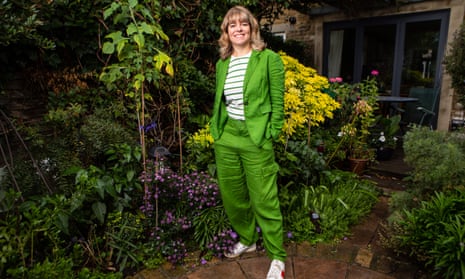Why we all need to be a lot less hesitant about being kind

While researching a book on kindness, I found that being kind enhances the mood of not just the receiver – but the giver, too
One winter’s morning I was cycling to work when I saw a man in flip-flops and shorts walking fast in the opposite direction to me and calling out the name “Lola”. It seemed strange that anyone would be out in this freezing weather in those clothes, but I cycled on without thinking any more about it. Suddenly the cars in front of me screeched to a stop as a little terrier ran across the road. A woman in a raincoat called to the frightened dog “Poochy, Poochy!” Again, I cycled on, wondering why she had let her dog off the lead on such a busy street.
I’d been cycling for another 10 minutes when I worked out what I’d witnessed. Of course! The little dog wasn’t called Poochy. She was Lola. She didn’t belong to the woman in the raincoat but to the man in flip-flops and shorts. Clearly Lola had somehow escaped and the man was searching for her.
I could have cycled back and helped restore the dog to its owner. That would have been the kind and thoughtful thing to do. But I didn’t. I cycled on.
This incident is recorded in the diary I kept while I was working on my book on how to be kinder, and illustrates a common issue with kindness: that we’re often hesitant to do the right thing. I don’t consider myself to be any kinder than anyone else, but in this case, the reason I didn’t go back wasn’t because I was being unkind or thoughtless. Rather, I was worried about how my intervention might be perceived. If I cycled back to the woman in the raincoat and tried to take the dog from her, claiming I knew who the owner was, would she think I was trying to steal it, since I didn’t actually know him? I also excused myself from acting by telling myself that other people had probably stepped in to help by now. Wouldn’t it perhaps be embarrassing to speed back up the road, just as the man in shorts was reunited with Lola?
I comfort myself with the thought that my hesitancy in this instance probably didn’t really matter. The dog was safe, the chances are that she was microchipped and Lola and shorts-man were hopefully reunited. But I might have saved him some time and heartache.
In my book, The Keys to Kindness, I draw on the world’s largest in-depth study into kindness, the Kindness Test, which I worked on with a team led by Professor Robin Banerjee at the University of Sussex and launched on BBC Radio 4 in 2021. More than 60,000 people from 144 countries chose to take part. Participants answered questions on their levels of kindness, their perception of the view of kindness in the workplace, their wellbeing, personality, health, value systems and more. One of the findings that most intrigued me was that the chief obstacle to us carrying out more kind acts is not that we don’t care, but that our actions might be misinterpreted. I’d categorise myself as a hesitant helper. I’m no saint, but I want to be kind if I can and yet it seems I’m not alone in being held back by a fear that my offer of help might not be welcome.
Of course, this is not an entirely baseless fear. Someone I know who is blind says – only half-jokingly – that he doesn’t dare slow down as he passes a pedestrian crossing because if he does, before he knows it, someone has dragged him across to the other side of the road even though he didn’t want to go there. But the lesson here is an obvious one: ask someone if they want help before you act. Don’t just assume they do.
And examples like this don’t alter the bigger issue, that we are too often inhibited from acting on our kindly instincts for fear of how our actions will look to others. At one level, what holds us back is mere social embarrassment, a concern that we will be seen as a “do-gooder” or “virtue signaller”. One instance of this has arisen as a result of the Covid-19 pandemic. Instead of viewing the wearing of face masks in crowded places as a kind and responsible action when infection levels are high, it has been characterised in some quarters as showing off, as parading a sense of moral superiority. The result is that people who probably would be willing to put up with the mild inconvenience of wearing a mask sometimes feel inhibited from doing so.
READ RELATED: My friend’s ex gives him no parental rights. How can I help him? | Ask Annalisa Barbieri
Since delving into the topic of kindness I’ve been trying to put into practice insights from the work of the University of Sussex academic Gillian Sandstrom. She researches the impact of talking to strangers and has found that striking up a conversation with someone you don’t know can in itself be an act of kindness. In her studies she asked people to talk to strangers and found that in the majority of cases both parties report enhanced wellbeing and a boost to their mood. Of course, you need to pick your moments; this doesn’t mean that every person you sit beside on a train will be delighted if you start talking to them. But if you’re in a shop or waiting at a bus stop, why not exchange a few words? They might not want to talk and you could face the embarrassment of being rebuffed. But my feeling is: so what? You’re never going to see them again. And the chances are they’ll like it.
In the Kindness Test the second most common barrier to kindness was not having the time to carry out kind acts. With all the pressures that people have on their time, it wasn’t surprising that so many said this. But here, the data can also be our guide. Kind acts don’t have to be huge. Yes, you could train for months to do a sponsored marathon to raise thousands for charity or volunteer each week at your local hospice (and don’t let me stop you if you want to do either of those things), but if you really don’t have the time, small acts can make a difference, too. In fact, in the Kindness Test the top five ways that people told us they were kind weren’t huge at all. They included opening doors, picking up things people had dropped and having concerned feelings for people less fortunate than themselves.
And this is how kindness in fact turned out to be very common in the study: 16% of people said they had received an act of kindness within the last hour and a further 43% received an act of kindness within the last day.
So now that I’m immersed in kindness research, I’m trying to do more of these little things. If I think someone has done something I admire at work, I email them to say so, I smile at strangers and I try hard to really listen when I’m having conversations with people. These things barely take any extra time.
I’m also trying to shed the embarrassment. In situations where I might be able to do a kind thing, I’m more inclined to go for it. There is more kindness in the world than we sometimes think, but there is always room for more. So, if I see an elderly neighbour apparently struggling with their shopping, I’m more likely these days to ask if I can help. There’s a chance that they might think I’m patronising them or making ageist assumptions. I might cause mild offence or embarrass myself. But in the great scheme of things, does that really matter? I prefer to make a presumption that my kindly intentions will be kindly accepted.
On my birthday recently I took a small cake into the place where I was working. The two security guards at the front door commented on the cake on the way in, with one saying that lemon drizzle cake was his favourite. When I reached the office most people turned out to be WFH, so there was plenty of cake going spare. I had the idea of cutting a couple of slices, wrapping them in some tissue and taking them down to the security guards. But would they think that was silly or over the top or might it be awkward because they’re probably not supposed to eat on duty? I decided to do it anyway. If we want to be kinder sometimes we have to take risks. They were very surprised, and clearly delighted.
And if I ever see Lola running loose in the street again, I won’t just assume someone else will catch her and return her to her owner, I’ll make the effort to do it myself.
Claudia Hammond is Visiting Professor for the Public Understanding of Psychology at the University of Sussex and author of The Keys to Kindness (Canongate, £16.99), available from guardianbookshop.com for £14.78
Source: Health & wellbeing | The Guardian




